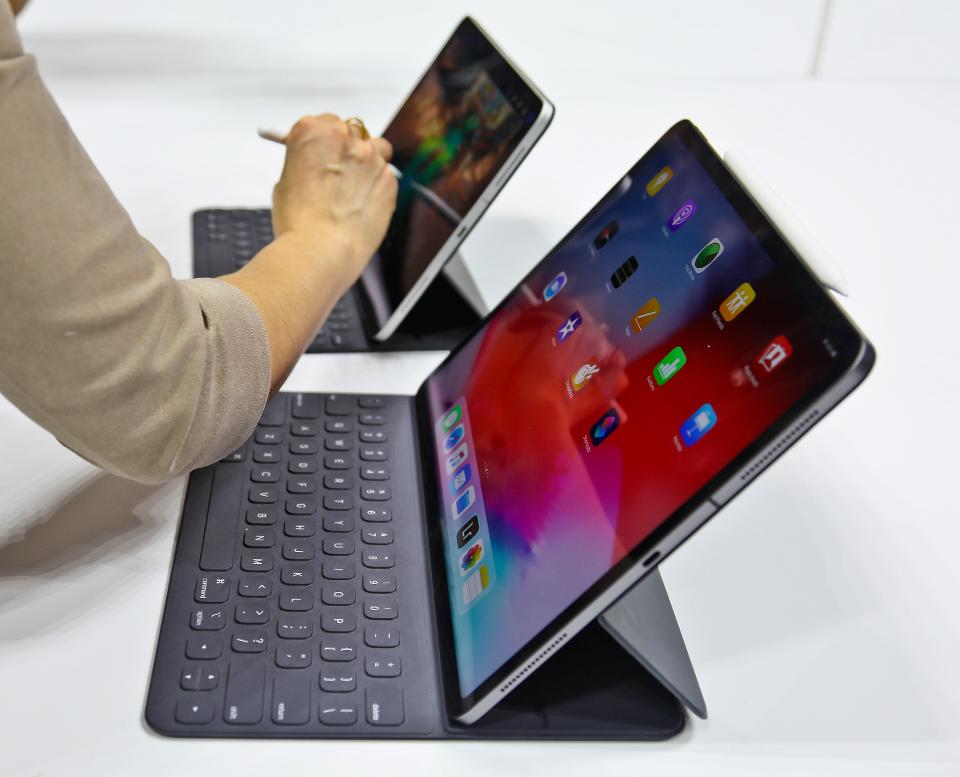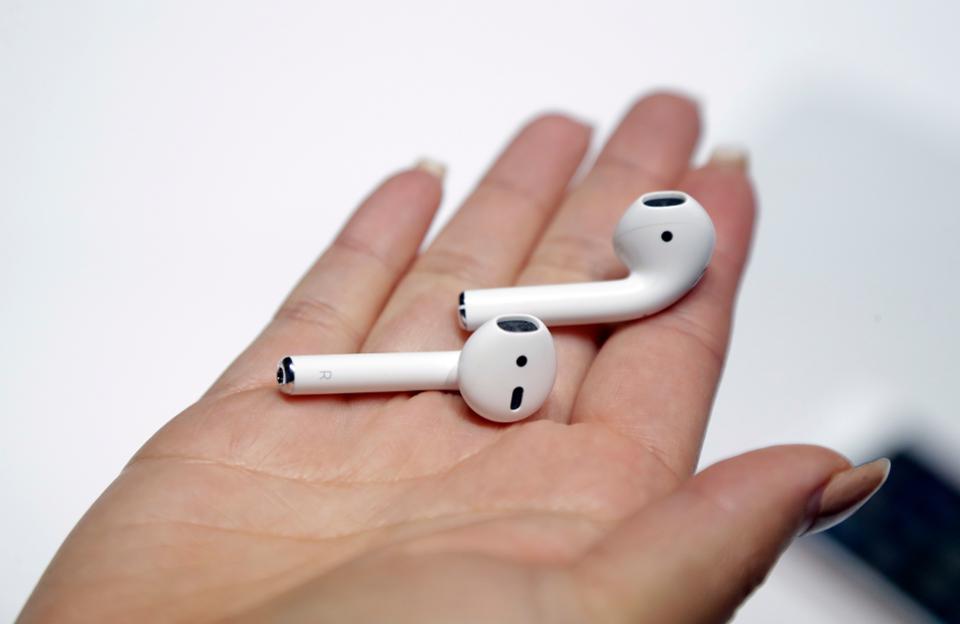
July 12 update to iPhone 12 specs story; update to AirPods story. This edition of Apple Loop originally published Friday July 10.
Taking a look back at another week of news and headlines from Cupertino, this week’s Apple Loop includes new iPhone 12 features, the return of the old iPhone design, saying goodbye to the MacBook Air, a new display for the iPad Pro, updated technology for the AirPods, changing defaults on the HomePod, and new privacy lights for iOS 14.
Apple Loop is here to remind you of a few of the very many discussions that have happened around Apple over the last seven days (and you can read my weekly digest of Android news here on Forbes).
iPhone 12’s Super Slo-Mo Video Revealed
Apple’s upcoming smartphone, like many designs, is leaning into the camera as a point of both differentiation for consumers and technical superiority over the competition. The latest beta of iOS 14 suggests that a super slo-mo options will be available when recording at 4K resolutions. Forbes’ Gordon Kelly reports:
“[Pineleaks writes] “Both 4k 120 and 240 FPS will most likely be used for slow motion video. Don‘t expect 4k 240 to be available for normal video. 4k 120 remains possible.” These video modes would represent a seismic leap for smartphone video recording and a massive differential from the competition. With acclaimed Apple analyst Ming-Chi Kuo also promising new “high-end” camera lenses in the range, we should expect significant change to both the look and layout of the primary cameras in all the new iPhones.”

In this April 18, 2011 photo, a customer tries an Apple iPhone 4 at a Verizon store in Mountain … [+]
The New iPhone’s Old Design Feels Perfect
One of the design points of the iPhone 12 family that has been heavily discussed is the return to the straight-edged and more box-like structure first seen in the iPhone 4. That design language, started in 2010, was retired with the iPhone 6. Now it’s back in fashion on the larger handsets. Boilerplate versions of the external design – to test fit and function – have leaked and, as Gordon Kelly reports, it’s a design that still works.
“The new sizes are also a factor. After time with the models, [YouTuber] iupdate notes that the model he was least interested in, the 5.4-inch iPhone 12, ended up being his favorite because it was so compact and usable one-handed (note: it’s even smaller than the new iPhone SE). I suspect this will surprise a lot of buyers and I have already tipped it to become the top selling iPhone 12 model, especially considering its price. Conversely the enlarged 6.7-inch iPhone 12 Pro Max is a monster when the two models are positioned side-by-side.”
Update July 12: The physical design is not the only trick that Apple is bringing over from the old ethos. The lower-priced iPhone 12 and iPhone 12 Max are going to ship with a paltry 4GB of RAM. In Apple’s defence iOS is more efficient with memory than Android devices, but the potential of extra RAM will be missed by many when working with high-impact applications and games. Tim Hardwick reports:
“Barclays analyst Blayne Curtis previously said he believes the iPhone 12 Pro models will feature 6GB RAM, while the iPhone 12 will have 4GB RAM. UBS analysts also believe the four iPhones in development will feature varying amounts of RAM. They’re expecting a 6.7-inch iPhone with 6GB RAM, a 6.1-inch iPhone with 6GB RAM, a 6.1-inch iPhone with 4GB RAM, and a 5.4-inch iPhone with 4GB RAM.”
The New iPhone’s Old Design Feels Perfect
One of the design points of the iPhone 12 family that has been heavily discussed is the return to the straight-edged and more box-like structure first seen in the iPhone 4. That design language, started in 2010, was retired with the iPhone 6. Now it’s back in fashion on the larger handsets. Boilerplate versions of the external design – to test fit and function – have leaked and, as Gordon Kelly reports, it’s a design that still works.
“The new sizes are also a factor. After time with the models, [YouTuber] iupdate notes that the model he was least interested in, the 5.4-inch iPhone 12, ended up being his favorite because it was so compact and usable one-handed (note: it’s even smaller than the new iPhone SE). I suspect this will surprise a lot of buyers and I have already tipped it to become the top selling iPhone 12 model, especially considering its price. Conversely the enlarged 6.7-inch iPhone 12 Pro Max is a monster when the two models are positioned side-by-side.”
Goodbye MacBook Air?
With the move to ARM, Apple has the chance to redefine what it means to be a Mac. Included in that ‘clean sheet of paper’ thinking is what Mac hardware there needs to be. With the power and thermal advantages of ARM (to name two), there is an ongoing discussion within Apple on unifying the Mac laptops under a single brand name. J. Glenn Künzler lays out the ARM-powered arguments against the MacBook Air:
“Using incredibly powerful chips that require less cooling, it now makes a lot less sense for Apple to sell two distinct 13-inch notebooks. Instead, what we’ve heard, and which, again, makes a huge amount of sense, is that Apple, going forward, will offer only a single line of notebooks, which will simply be called “The New MacBook”, or just “MacBook”.
“If you can make a “MacBook Pro” practically as thin and light as a “MacBook Air,” why would you not do that? Apple’s more efficient chips make that far more possible and likely than it has ever been.”
Read more at SonnyDickson.com.

An iPad Pro is reviewed after an event announcing new products Tuesday Oct. 30, 2018, in the … [+]
iPad Pro Will Introduce New Display
Apple’s update to the iPad Pro, expected next year, could be the first use of MiniLED technology in the display. This has been a long time coming, and the delay into 2021 from the expected launch in 2020 is lily down to supply chain issues and a lack of face-to-face development time brought on by the coronavirus pandemic. Chance Miller reports:
“…Apple’s transition to mini LED technology will start with the 12.9-inch iPad Pro during the first quarter of 2021. At the same time, Apple is also reportedly expected to begin sourcing suppliers for mini LED technology for the 16-inch MacBook Pro and a new 14-inch MacBook Pro.
“Mini LED screens offer a rich wide color gamut, high contrast ratios, high dynamic range, and localised dimming. mini LED is also believed to result in thinner panels that are more power-efficient, and they do not suffer from burn-in like OLED.”
New Technology For Apple’s AirPods
Apple looks set to bring the AirPods Pro ‘system in package’ design to the entry level AirPods later this year. This packs multiple integrates circuits into a single plastic housing, allowing for more hardware to be placed in a smaller space – something that wireless earbud designers particularly appreciate. Mikey Campbell reports:
“The Cupertino tech giant will introduce the chip packaging technology in its entry-level AirPods product for the first time in 2021, Kuo said in a research note Monday. What, exactly, that means for end users remains unclear, though it could herald a trickle down effect for more advanced features enjoyed by owners of the Pro designated variant.”
July 10 update: Tech Radar’s Olivia Tambini is not so sure. The electronics inside the AirPods may be improving, but the external design? That is in serious need of a refresh:
“These ear stems may have allowed for the implementation of touch-sensitive controls, but as the AirPods Pro have proven, these controls don’t require a huge footprint to work.
“‘Plus, innovations in system-in-package electronics (SiP), [discussed above] means that you can squeeze an awful lot more tech into smaller devices. It’s a technology used by the AirPods Pro, and it’s rumored that it will be utilised once more for the AirPods 3 – so, with no mechanical need for those long ear stems, there’s nothing stopping Apple from getting rid.”

The new Apple AirPods are shown during an event to announce new Apple products on Wednesday, Sept. … [+]
HomePod Allows Default Changes
A new beta of the HomePod software allows users to decide on the default media services to use for music, podcasts, and audiobooks. Not everyone has access, this looks like a small-scale test, but it’s a feature long asked for by many Apple users, not just of the HomePod. Juli Clover reports:
“At the current time, third-party music services like Spotify can only be streamed on the HomePod using AirPlay and an iPhone, iPad, or Mac. The new feature will presumably allow Spotify and other music services to be set as the default music service, letting users ask Siri to stream music from Spotify.
“Third-party app developers may need to implement support for the HomePod , as Spotify is not listed as an option at the current time.”
And Finally…
Part of the new notification bar in iOS 14 shows some mysterious orange and green dots. These are privacy indicators, which show when apps are accessing your phone’s camera and microphone. Benjamin Mayo reports:
“It turns out these dots are actually informational indicators that help reassure and protect your privacy. On MacBooks and iMacs, Apple has a physical green LED that sits next to the webcam.
“When the camera is accessed, the LED light turns on to let you know that an application on your system is watching the camera feed. iPhones and iPad do not have physical LEDs so Apple has simulated the experience through software.”
Apple Loop brings you seven days worth of highlights every weekend here on Forbes. Don’t forget to follow me so you don’t miss any coverage in the future. Last week’s Apple Loop can be read here, or this week’s edition of Loop’s sister column, Android Circuit, is also available on Forbes.